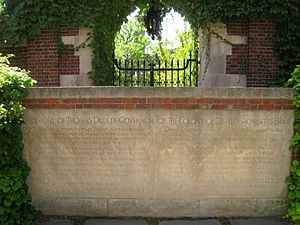Thomas Dudley facts for kids
Quick facts for kids
Thomas Dudley
|
|
|---|---|
| 3rd, 7th, 11th, and 14th Governor of the Massachusetts Bay Colony | |
| In office 1634–1635 |
|
| Preceded by | John Winthrop |
| Succeeded by | John Haynes |
| In office 1640–1641 |
|
| Preceded by | John Winthrop |
| Succeeded by | Richard Bellingham |
| In office 1645–1646 |
|
| Preceded by | John Endecott |
| Succeeded by | John Winthrop |
| In office 1650–1651 |
|
| Preceded by | John Endecott |
| Succeeded by | John Endecott |
| Personal details | |
| Born | 12 October 1576 Yardley Hastings, Northamptonshire, England |
| Died | 31 July 1653 (aged 76) Roxbury, Massachusetts Bay Colony |
| Spouses |
Dorothy Yorke
(m. 1582; died 1643)Katherine Hackburne
(m. 1644) |
| Parent |
|
| Profession | Colonial administrator, governor |
| Signature |  |
Thomas Dudley (born October 12, 1576 – died July 31, 1653) was an important leader in the early days of the Massachusetts Bay Colony. He served several times as the colony's governor. Dudley helped start Newtowne, which is now Cambridge, Massachusetts, and built its very first house.
He also gave land and money to help create the Roxbury Latin School. In 1650, when he was governor, he signed the new official document for Harvard College. Dudley was a very religious Puritan. He believed strongly that everyone should follow Puritan rules. He was stricter than some other early leaders like John Winthrop, but not as tough as John Endecott.
Dudley's daughter, Anne Bradstreet (1612–1672), became a famous poet in early America. Parts of Harvard Yard and the town of Dudley, Massachusetts are named after his family.
Contents
Early Life and Adventures
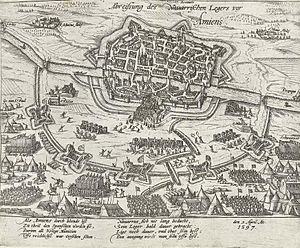
Thomas Dudley was born in Yardley Hastings, a village in England, on October 12, 1576. His parents were Roger and Susanna Dudley. His father, Roger Dudley, was a soldier who died when Thomas was young.
Like many young men from good families, Thomas Dudley became a page (a young servant) for a nobleman. Later, he joined the English army. He fought with King Henry IV of France during the French Wars of Religion. He was part of the fight against the Spanish at the Siege of Amiens in 1597. This battle ended the war.
After his time in the army, Dudley worked for Sir Augustine Nicolls, a lawyer and judge. Nicolls was known for being honest and supported the Puritan religion. This experience likely shaped Dudley's own strong beliefs. After Nicolls died, Dudley became a manager for the Earl of Lincoln's estates. The Earl's home was a center for Puritan ideas. Dudley was already known for his strong Puritan values. He helped the Earl with money matters and even helped arrange his marriage. In 1622, Simon Bradstreet began working for Dudley and later married Dudley's daughter, Anne.
Journey to Massachusetts Bay Colony
In 1628, Thomas Dudley and other Puritans decided to create the Massachusetts Bay Colony. They wanted to build a Puritan settlement in North America. Many people connected to the Earl of Lincoln were involved. The company first sent a small group of settlers to Salem.
In 1629, the company decided to move its main leadership and official papers to the colony itself. This was a big decision! John Winthrop was chosen as governor, and Dudley became his deputy. On April 8, 1630, Dudley and his family sailed to the New World on the ship Arbella. They arrived in Salem on June 12.
The leaders found Salem was not the best place for a large colony. So, Winthrop and Dudley explored other areas. They decided to spread out the colonists in different places. This way, they wouldn't be an easy target if enemies attacked. The Dudleys likely spent their first winter in Boston.
Building Cambridge
In 1631, the leaders agreed to make Newtowne the colony's capital. This area is now Harvard Square in Cambridge. Dudley and others built their homes there. However, Winthrop decided to build his home in Boston instead. This made Dudley angry, and he even thought about returning to England. But after others stepped in, Dudley and Winthrop made up. Winthrop later said they "kept peace and good correspondency in love and friendship."
In 1632, Dudley paid to build a palisade (a strong fence) around Newtowne. This fence protected the town from wild animals and Native American raids. The colony later agreed to pay him back by taxing all the nearby towns. This decision led to early forms of representative government in North America. Each town chose two people to advise the governor. This idea was used for the whole colony in 1634, the year Dudley became governor for the first time.
Dealing with Challenges
The colony faced legal problems in 1632. An English nobleman, Sir Ferdinando Gorges, tried to claim the land. He questioned the colony's official charter. When the colony's leaders wrote a response, Dudley was the only one who didn't want to use fancy titles for the King and English bishops. Even though King Charles I issued an order in 1635 to return the charter, the King's money problems stopped it from happening. The issue eventually went away.
The Anne Hutchinson Story
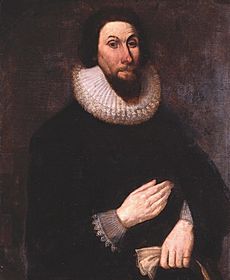
From 1635 to 1639, Dudley was either deputy governor or a member of the council. In 1636, Henry Vane was governor. The colony was divided over Anne Hutchinson. She arrived in 1634 and began teaching different religious ideas. Most of the colony's leaders, including Dudley and Winthrop, disagreed with her. This disagreement caused a big split in the colony.
In the end, Anne Hutchinson was sent away from the colony. Many of her followers also left. She went to Rhode Island, where Roger Williams offered her a safe place. Dudley was likely a strong voice in the decision to banish her.
Henry Vane was replaced by Winthrop as governor in 1637. Winthrop served three terms. In 1640, Dudley was elected governor again. This was partly because people worried Winthrop had been governor for too long.
Even though Dudley and Winthrop sometimes disagreed, they worked together on important issues. In 1638, they were each given land near Concord. They went together to choose their land. Winthrop, who was governor, let Dudley choose first. Dudley's land became Billerica, and Winthrop's became Bedford. Two large stones marked where their lands met, called the "Two Brothers" rocks. This was to remember their friendship.
More Political Work
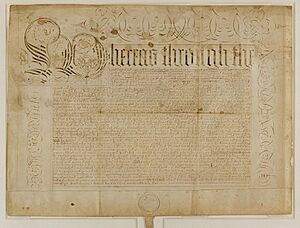
During Dudley's time as governor in 1640, many new laws were created. These laws led to the Massachusetts Body of Liberties in 1641. This document included important rights that were later put into the United States Bill of Rights.
When he was governor again in 1645, the colony almost went to war with the Narragansetts. They had been fighting the Mohegans, who were allies of the English. The Narragansett leader signed a peace agreement that lasted for 30 years. Dudley also oversaw a trial where John Winthrop was found innocent of misusing his power.
In 1649, Dudley was chosen to lead the New England Confederation. This group helped the New England colonies work together. However, he was 73 and ill, so he couldn't do the job. Despite his illness, Dudley was elected governor for the fourth and last time in 1650. During this term, he signed a new charter for Harvard College. He also made the decision to burn a book by William Pynchon that had religious ideas the Puritans considered wrong.
When he wasn't governor, Dudley often served as deputy governor or as a representative to the New England Confederation. He also worked as a judge in the colonial courts and helped write the colony's laws. He had strong, traditional views.
Supporting Education
One of thy founders, him New-England know,
Who staid thy feeble sides when thou wast low,
Who spent his state, his strength, and years with care,
That after comers in them might have share.
In 1637, the colony decided to create a new college in Newtowne. Dudley was part of the committee that made this happen. In 1638, a colonist named John Harvard gave his library and half of his money to the college. So, it was named Harvard College in his honor. Dudley signed the college's second official charter in 1650 and served as one of its leaders for many years. Harvard University's Dudley House is named after the Dudley family.
In 1643, Reverend John Eliot started a school in Roxbury. Dudley, who lived in Roxbury at the time, gave a lot of land and money to this school. It is still open today as the Roxbury Latin School.
Family and Lasting Impact
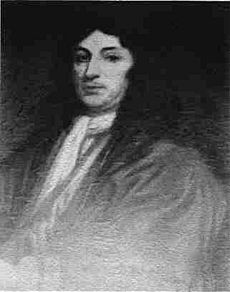
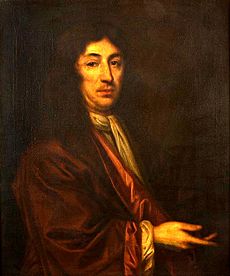
Thomas Dudley married Dorothy Yorke in 1603. They had five or six children.
- Their first child, Samuel, also came to the New World. He married Winthrop's daughter Mary in 1633.
- Their daughter Anne married Simon Bradstreet and became the first poet published in North America.
- Patience, their third child, married a colonial officer named Daniel Denison.
- Sarah, their fourth child, married Benjamin Keayne. This marriage was not happy, and Sarah later married again to Job Judkins.
- Mercy, their last child with Dorothy, married a minister named John Woodbridge.
Dorothy Yorke died on December 27, 1643. Her daughter Anne wrote a poem about her:
Here lies,
A worthy matron of unspotted life,
A loving mother and obedient wife,
A friendly neighbor, pitiful to poor,
Whom oft she fed and clothed with her store;
Dudley married his second wife, Katherine Hackburne, in 1644. They had three children: Deborah, Joseph, and Paul. Joseph later became governor of the Province of Massachusetts Bay.
In 1636, Dudley moved from Cambridge to Ipswich. In 1639, he moved to Roxbury. He died in Roxbury on July 31, 1653, and was buried there. The town of Dudley, Massachusetts is named after his grandsons, Paul and William.
Today, the Massachusetts Department of Conservation and Recreation owns a park in Billerica called Governor Thomas Dudley Park. The "Two Brothers" rocks, which marked the land shared by Dudley and Winthrop, are in the Great Meadows National Wildlife Refuge in Bedford.
Dudley Square Renaming
Dudley Square in Boston's Roxbury neighborhood was named after Thomas Dudley. Recently, there has been a discussion about changing the name to Nubian Square. Some people who supported the change pointed out that Dudley was a leader in 1641, when the colony first allowed slavery by law. However, others, like Byron Rushing from the Museum of African American History, have stated that they found no evidence that Dudley himself ever owned enslaved people.
In November 2019, Boston residents voted on whether to rename Dudley Square to Nubian Square. The vote showed that the question was defeated overall. However, the Mayor of Boston, Marty Walsh, noted that the question passed in the areas surrounding the square. On December 19, 2019, the city's Public Improvement Commission officially approved changing the name of Dudley Square to Nubian Square. The Dudley train station was also renamed Nubian station in June 2020.


